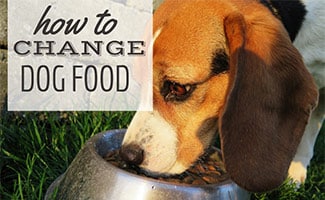What to Give Dogs With Upset Stomach and Diarrhea
 Does your dog have an upset stomach? Normally dogs will eat grass to clean out their system. This is the natural method to cure your dog's sick tummy.
Does your dog have an upset stomach? Normally dogs will eat grass to clean out their system. This is the natural method to cure your dog's sick tummy.
However, this won't always do the trick. In fact, your dog may not even feel like eating grass. So, here are some additional tips to help cure your dog's upset tummy.
Article Overview
- What Are Common Symptoms?
- Tips To Cure My Dog's Upset Tummy
- How To Check My Dog's Temperature
- Products To Help My Dog
- Should I Give My Dog A Probiotic?
- Natural Remedies
- What's Causing My Dog's Upset Stomach? (Infographic)
- What Are The Dangers?
- Call The Vet During An Emergency & Consider Pet Insurance
What Are Common Symptoms Of An Upset Canine Belly?
 If your dog is experiencing any of these symptoms or unusual behaviors, they may be suffering from an upset stomach.
If your dog is experiencing any of these symptoms or unusual behaviors, they may be suffering from an upset stomach.
- Appetite loss
- Diarrhea
- Floor licking
- Flatulence
- Grass eating
- Gurgling stomach noises
- Salivation
- Vomiting
Home Remedy vs Vet Consultation
Often, you can treat your dog at home for an infrequent sick stomach. However, if they have repeated incidents or experience any of these more serious symptoms, we recommend that you take your dog to a veterinarian right away.
Symptoms That Require A Vet Visit
- Anxious pacing
- Bloody stool
- Continuous vomiting
- Dehydration
- Distended stomach
- Dry vomiting (nothing coming out)
- Fever
- Lethargy
- Ongoing diarrhea
- Uncontrollable drooling
- Weight loss
Any of these symptoms could point towards a more severe condition that requires veterinary attention.
Even if your dog has a case of only mild stomach upset, always talk with your vet before trying any home remedies.
Tips To Cure Your Dog's Upset Stomach
 Here are a few things you can try at home before seeking medical attention.
Here are a few things you can try at home before seeking medical attention.
Keep Your Pup Hydrated
One of the most important things is to keep your pup hydrated at all times. Hydration won't cure the upset stomach, but it can help your dog feel better.This is especially important if they are experiencing lots of vomiting or diarrhea. Dehydration from vomiting and diarrhea occurs because the dog is losing too much fluid.
Don't assume that you can prevent dehydration by offering water to your furry pet. Your dog may feel so icky that they don't even feel up to drinking water.
Losing fluid also means losing essential electrolytes and vitamins. One possible solution to this dilemma is to use Pedialyte.
You can obtain a dry mixture made for animals by going to your nearest farming store. The packet is mixed with water and then fed to the dog (check with your vet first before giving the mixture to your dog). If your dog does not improve quickly, do not continue to try self-treating. Dehydration in dogs can quickly progress from a passing concern to one of possible organ failure and even death.
So, please,if your dog's symptoms last more than 24 hours, take him to the vet immediately for treatment.
Should You Give Your Dog Pepto-Bismol Or Pepcid?
Another remedy is a little bit of Pepto-Bismol or Pepcid crushed and mixed with water (the amount will depend on your dog's weight — consult your veterinarian). It is possible that these products' manufacturers may change their formulas over time and may not be as safe as they once were for pups. As with any treatment, always consult a vet before proceeding with treatment. Learn more about Pepto Bismol for dogs.
Note that the Pepto-Bismol or Pepcid may make your dog's stool darken quite a bit — this is not a reason for alarm.
Check Your Dog's Temperature
We recommend using a rectal thermometer because it is the most accurate option (put lube on the thermometer first). An ear thermometer is also an option but not as precise. A dog's normal body temperature is 101 to 102.5°F. A temperature above 104°F is a fever. If the temperature is higher than 104°F or lower than 99°F, you should go to the vet or emergency vet hospital immediately. A fever or drop in body temperature signals a serious illness that requires prompt veterinary treatment.
Find Out What Your Dog Ate
Looking for clues may help the vet's diagnosis of your dog's situation. If your dog has nibbled on any houseplants, that's a red flag. Many houseplants are toxic to dogs. Also, check the trash bags and cans around your home for signs of scavengers. Be sure to reference our list of foods not to feed dogs for more possible toxic foods to consider.
Products To Calm Your Dog's Upset Stomach
Here are a few products you can try out that have proven to be successful for other sick pups.
DiarRice For Dogs

Rice is a natural remedy for diarrhea symptoms in humans, but pups can't digest it as well, and therefore it could further upset their stomach. However, DiarRice is a rice-based probiotic with all the same soothing properties of rice in an easily digestible format that tastes like chicken.
You can mix with either wet food or dry food (adding a little water). DiarRice should start doing the trick immediately. So if you don't see signs of improvement right away, you should seek further medical attention.
Follow the product's instructions carefully.
Pedialyte

If your dog still isn't feeling well and you wish to feed them Pedialyte or some other mixture that will help prevent dehydration, you're going to need a syringe (without a needle) and a towel. Your dog isn't going to want to eat anything, just as you don't want to eat when you don't feel good. Because of this, you may need some assistance when feeding your dog.
After filling the syringe with the mixture, lay your dog on their side. Open their mouth and slowly empty the syringe's contents. If your dog still doesn't want to swallow the mixture, gently massage their throat to prompt the swallowing response.
Another method is positioning the syringe inside the back of your dog's cheek and empty the syringe's contents. Again, massage the throat as needed for swallowing. If you choose to use the cheek method, watch to make sure the liquid does not come out the other side of the mouth. Sometimes dogs will let the liquid drain out if they don't have the energy or urge to swallow.
Remember to talk with your veterinarian before giving your dog Pedialyte. You want to be sure that it's safe to give your dog Pedialyte and that you're giving your dog the appropriate amount for their size.
Probiotics For Dogs
If your dog suffers from chronic digestive problems, a dog probiotic could help. Probiotics for dogs work the same way as they do for humans. The formulas contain living gut-friendly bacteria found naturally in the digestive tract and other areas of the body.
 The goal of ingesting probiotics is to maintain healthy levels of good bacteria, prevent gastrointestinal problems, and boost the immune system after disruption from illness, infection, antibiotic treatment, or other stressors.
The goal of ingesting probiotics is to maintain healthy levels of good bacteria, prevent gastrointestinal problems, and boost the immune system after disruption from illness, infection, antibiotic treatment, or other stressors.
There are many pet probiotic products available, so be sure to read our article that highlights the best probiotics for dogs and includes more information on how these products can help solve your pup's digestive problems.
Natural Remedies To Cure Your Dog's Upset Stomach
If you prefer not to give your dog human medications, some natural home treatments can do the trick. However, these may not be the best cure for your dog, so make sure you check with your veterinarian before proceeding.
 Some natural home remedies include:
Some natural home remedies include:
- Banana baby food
- Rice with boiled chicken (boneless and no salt or seasonings added) – Exact portion can vary by dog. We suggest starting with a half cup of cooked rice and about 4 ounces of chicken. If your dog isn't drinking water, add some water to the mixture as well.
Do not use hamburger meat (ground beef) – This is a fairly common recommendation on forums, but the meat is too greasy and will not help your dog's upset stomach (nor is it healthy for your dog).
What Causes Dogs To Get An Upset Stomach?
You might be curious to know what caused the upset stomach to begin with. The causes of an upset stomach in dogs could stretch a mile long. We'll go through a few common causes here.
Changing Your Dog's Food
Although dogs will eat almost anything you put in front of them, their stomachs don't always agree with this free-for-all type of consumption. One of the most likely causes for an upset stomach is a change in diet. Something as simple as a change in brand or flavor of dog food can upset a dog's tummy. Also, making that shift too quickly can cause upset because the digestive system needs time to adjust to diet changest.
So make sure you still have some of your dog's current food to allow time for the transition. For about a week, slowly start mixing in more and more of the new food into less and less of the current food until the shift is complete.
 Read our articles on changing dog food and transitioning your puppy to adult dog food for more specific details. Go slow and keep an eye on your dog while changing food to make sure they remain healthy. And make sure your dog doesn't eat too fast (even if they absolutely love the new food) as that can also cause an upset tummy. Consult your vet if you have any questions during this process of changing dog food or run into any health concerns.
Read our articles on changing dog food and transitioning your puppy to adult dog food for more specific details. Go slow and keep an eye on your dog while changing food to make sure they remain healthy. And make sure your dog doesn't eat too fast (even if they absolutely love the new food) as that can also cause an upset tummy. Consult your vet if you have any questions during this process of changing dog food or run into any health concerns.
If you haven't changed your dog's diet, you might start searching for another reason.
Common Causes and Treatments For A Dog's Upset Stomach Infographic
Dangers Of An Upset Stomach
While a sick tummy may be a relatively innocent and temporary ailment, it could also be an indicator of a more significant concern to explore with your vet. Here are some of the conditions that would require a greater level of care and urgency.
Dehydration
Dogs (and especially young pups) are very susceptible to dehydration. Chronic vomiting and diarrhea cause dogs to lose a lot of fluid, leading to dehydration. If your dog has been experiencing a lot of vomiting or diarrhea (or both) and has little interest in eating or drinking, then your dog is on the fast track to dehydration.
You can check to see if your dog is dehydrated by assessing their skin and gums. If you lift your dog's lip, the gums should have a shiny wet film and should feel wet to the touch. Gums that feel sticky and dry indicate dehydration.
Use the skin turgor test (also known as the skin tent test) to evaluate the skin for dehydration. To perform this test, squeeze the skin behind the neck to form a skin tent. Release the skin. If the skin stays in the pinched position, your dog is dehydrated. If it automatically goes back to lying flat on the neck, your dog is not dehydrated.
The skin turgor test is the same method used to check for dehydration in humans. If you've ever had someone pinch the skin on your hand and then watch to see if it goes back to its original form, you have experienced the same kind of dehydration test.
Underlying Issue
 In addition to discomfort and possible pain, an upset stomach may also be a symptom of an underlying issue. Your dog may have something as mild as the flu or as life-threatening as the parvovirus. If your dog has a bacterial infection or a virus, they are likely to show other signs along with an upset stomach.
In addition to discomfort and possible pain, an upset stomach may also be a symptom of an underlying issue. Your dog may have something as mild as the flu or as life-threatening as the parvovirus. If your dog has a bacterial infection or a virus, they are likely to show other signs along with an upset stomach.
Should the condition persist, the most dangerous threat is likely to be dehydration. This occurs when the body is unable to retain fluids. Water makes up around 75% of a dog's body weight, but even consuming large amounts of water may not be enough to prevent dehydration in your dog.
If You Have An Emergency, Call The Vet
If your dog is very ill and you cannot figure out how to help them, please call the vet.
No website can compare to a trained veterinarian and an actual in-person physical exam to determine the best treatment plan and guide you through this difficult time. And if you don't already have pet insurance, consider getting it as it can help save you money in future emergencies (in addition to protecting your dog's health).
Check out our pet insurance comparison, which has multiple tables to help you easily analyze the providers based on coverage, price, waiting periods, age restrictions, and more. You can also read our pet insurance reviews for brief summaries of the most popular companies.
Watch this video to learn the benefits of getting pet insurance and how it can help your dog (plus your pocketbook) in the future.
As dog owners ourselves, we know how challenging it can be to see your pup suffer. We hope your dog is feeling better soon.
About The Author: Michelle Schenker
Michelle is the proud co-founder of Canine Journal and a dog lover through and through. She oversees the business's day-to-day operations and marketing and brings over two decades of corporate business experience. Michelle led strategic planning, marketing, and growth efforts for national brands including Bank of America, Mattel, Hanes, and licensed products including Harry Potter and Batman. However, her first job in the canine field started in 1999 at a dog bakery!
Michelle is a licensed insurance professional and holds an MBA from Vanderbilt University. Her expert advice and opinions have appeared in outstanding media outlets, including Newsweek, The New York Times' Wirecutter, Forbes, People, Reader's Digest, and more.
Since the day she was born, Michelle has lived in a home full of dogs. Her adult home in North Carolina is no exception, where she and her husband (Alex) live with Lily and Barley, their two adorable rescue pups. Her favorite moments include walks in nature with the dogs, practicing yoga, traveling the globe, painting, and dancing her butt off at Jazzercise.
Disclaimer: This website contains reviews, opinions and information regarding products and services manufactured or provided by third parties. We are not responsible in any way for such products and services, and nothing contained here should be construed as a guarantee of the functionality, utility, safety or reliability of any product or services reviewed or discussed. Please follow the directions provided by the manufacturer or service provider when using any product or service reviewed or discussed on this website.
We are a participant in the Amazon Services LLC Associates Program, an affiliate advertising program designed to provide a means for us to earn fees by linking to Amazon.com and affiliated sites.
Disclaimer: The information provided through this website should not be used for diagnosing or treating a health problem or a disease. It is not a substitute for professional care. If you have or suspect you may have a health problem, you should consult your health care provider.
What to Give Dogs With Upset Stomach and Diarrhea
Source: https://www.caninejournal.com/cure-dogs-upset-stomach/
0 Response to "What to Give Dogs With Upset Stomach and Diarrhea"
Post a Comment